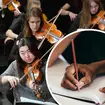Why do we call classical music ‘classical music’?
25 July 2022, 10:34

It’s not actually all Classical (big ‘C’) at all, so why has the name stuck as an umbrella term for Western instrumental, orchestral and choral music?
The Oxford Dictionary defines ‘classical music’ as “music written in a Western musical tradition, usually using an established form (for example a symphony). Classical music is generally considered to be serious and to have a lasting value.”
Oxford’s definition is just one example of how widespread the generalised use of ‘classical music’ is when it comes to describing instrumental, orchestral, vocal, choral and other forms of Western music.
But let’s really think about that term… ‘classical’. Why do we use it as an umbrella, catch-all phrase for Western music, and where do the Renaissance, Baroque, Romantic eras, and beyond, fit?
Here’s why the world has landed on ‘classical music’ to describe the powerful combinations of instruments, melody and harmony that make up the canon of Western music history.
Read more: Why are there only 12 notes in Western music?

YouTuber shows an incredible mashup of classical music
Big ‘C’ versus small ‘c’
Before we go further, let’s unpack this quickly. We use classical music (small ‘c’) to mean Western instrumental, orchestral, vocal and choral music – created for both secular and sacred settings.
But you may have also heard ‘classical’ in the context of the Classical era of music, roughly 1750-1830 and encompassing composers such as Mozart, Haydn and early Beethoven (although some say he kicked off the next era, the Romantic era (1830-1900) really).
The Classical era saw the formalisation of fixed structures, compositional techniques and orchestral sizes and shapes in the symphony, comic operas, and the Classical piano sonata.
Orchestras went through great changes: the harpsichord or organ of the previous Baroque era (1600–1750) were no longer orchestras’ musical foundation, and wind instruments such as the horn, trumpet, clarinet, flute and oboe joined the strings to create a new, distinctive sound.
Society was being reshaped by the Age of Enlightenment, a time of radical change where social values focused on human rights and freedom of religion. And the architectural style of the time was all about straight lines and order (as opposed to the more ornate styles of the Baroque), reminiscent of ancient Rome and Greece – hence the term ‘Classical’.
Read more: 10 of the best Classical era composers

The 15 most famous tunes in classical music
So why has ‘classical’ stuck?
‘Classical’ seems to work as a catch-all term of Western art music genres because it evokes this Classical, ordered era of Mozart, Haydn and Beethoven in which so many instrumental, chamber, orchestral and operatic forms we still hear regularly today were established.
Indeed, the lineage of the forms and tonality established in the Classical era can be seen to thread from the works of composers of earlier eras (Baroque, Renaissance, Medieval and before), to the works of Romantic, 20th Century and contemporary artists, as well as popular Western music genres like jazz, pop, rock and beyond. So perhaps it made sense to use it as shorthand to refer back to genres pre-dating modern history’s developments in popular culture.
Another reason the term started to stick was the inclination in the 19th Century for arts, culture and society to hark back to ‘classicism’, with its straight lines and order. Classicism was desirable, heralded and promoted widely following the preceding period of opulent, ornate Baroque styles in arts and architecture. Music was among the areas unable to escape this trend.

Beethoven Symphony No 9 Flashmob in Nuremberg, Germany.
“There isn’t any other word that seems to describe it better”
“People use this word to describe music that isn’t jazz or popular songs or folk music, just because there isn’t any other word that seems to describe it better,” the great composer and conductor Leonard Bernstein said in an instalment of TV’s Young People’s Concerts, broadcast in January 1959.
Bernstein goes on to say in his programme that ‘classical’ is better than the problematic alternatives of ‘good’, ‘serious’ and ‘art’ music – all terms which of course also apply to myriad other genres, from Jazz and RnB, to folk, country pop and beyond.
We like this idea very much. And if ‘classical’ is good enough for Bernstein, it’s good enough for us.
Click here to listen to our Essential Classical playlist on Global Player.


























